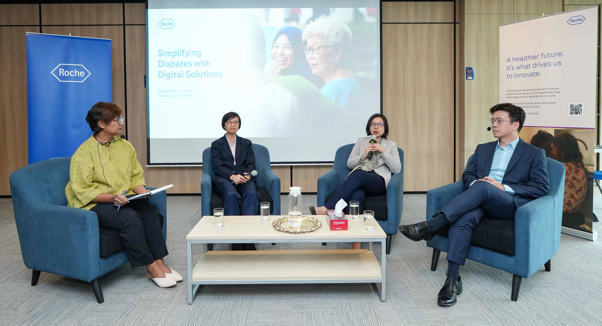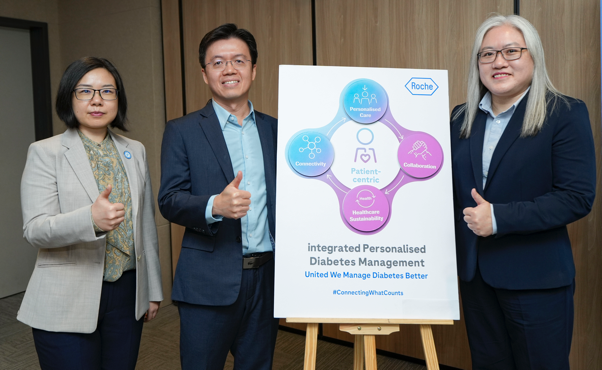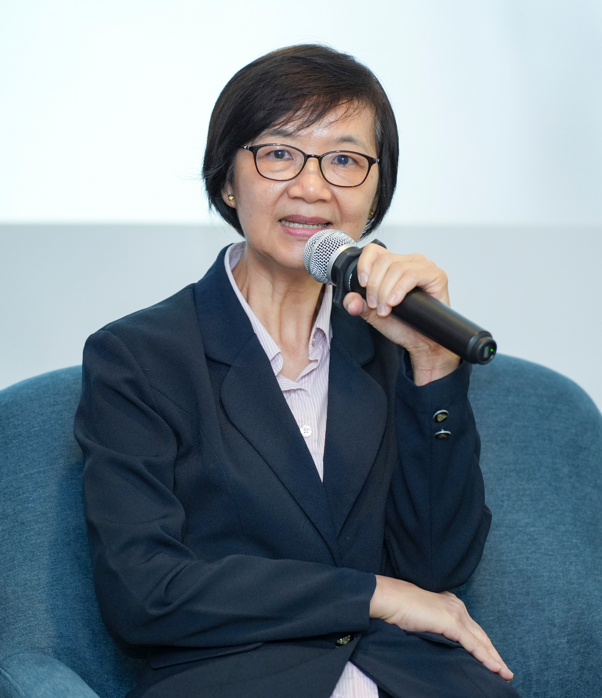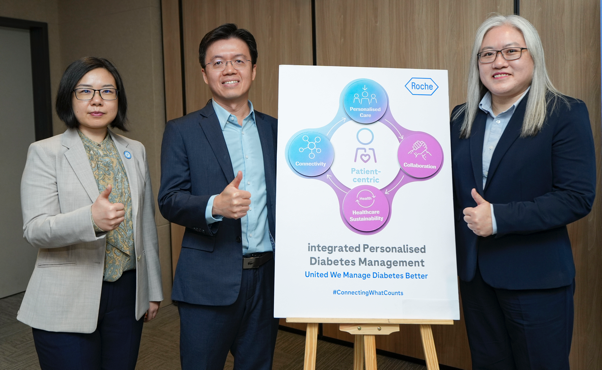Roche partners with healthcare experts to introduce accessible diabetes care
Roche Diagnostics Malaysia (Roche) joined hands with health experts on International Nurses Day to raise diabetes education and awareness about diabetes self-management using digital diabetes management applications.
Set against the backdrop of the global diabetes epidemic, one of the most urgent and quickest-growing global health emergencies of the twenty-first century,¹ Roche brought healthcare experts together for an engaging panel discussion to tackle crucial topics underpinning effective self-management for people living with diabetes (PwDs).

The discussion focused on an important foundational aspect of daily diabetes management – structured blood glucose monitoring using a blood glucose meter (BGM) by patients and their caregivers. In fact, the BGM is classified by the World Health Organisation as a ‘priority non-surgical intervention’ with a portable blood glucose meter being a ‘priority medical device’ for people living with diabetes².
As a means to simplify diabetes management and empower PwDs to improve their quality of life, an integrated Personalised Diabetes Management (iPDM) approach developed by Roche was presented.
A Patient-Centric and Collaborative Data-Driven Approach
Bryan Koh, Cluster Head of Asia Pacific Mature Markets, Roche Diabetes Care, said, “Roche is dedicated to advancing accessible diabetes care and fostering sustainable healthcare structures with our partners to alleviate the diabetes epidemic. We are here to provide patient-centred solutions to empower individuals to manage their condition, experience true relief, and lead normal, healthier lives.”
“Diabetes management is complex and personal for every individual. By combining technology with a deep understanding of the challenges that people living with diabetes face, we seek to enable them to navigate the daily complexities of diabetes management with confidence. The future of diabetes care lies in personalisation, connectivity, and collaboration for healthcare sustainability,” he said.
Roche’s iPDM strategy places self-monitoring of blood glucose using a blood glucose meter (BGM) as a cornerstone feature. It offers a holistic approach that supports a sustainable long-term continuum of care for PwDs.
Empowering Better Diabetes Management
Dr. Lim Lee Ling, Associate Professor of Medicine and Head of the Diabetes Care Unit, University of Malaya Medical Centre (UMMC) said, “There is an urgent need to prioritise structured self-management of diabetes to reduce the financial, physical, and psychological burden on people living with diabetes and its potential impact on the national healthcare system.”
“A lifelong chronic condition such as diabetes requires constant care by striking a good balance between dietary modifications, fitness regimens and personalisation of diabetes management.”
"Access to diabetes care has been made available and affordable in recent years. These include continuous support in promoting adherence of PwDs to diabetes management such as home glucose monitoring, scheduled follow-ups with feedback from doctors and diabetes nurse educators.
“Diabetes, as a chronic health condition, requires long-term commitment of PwDs and their families in its management to avoid complications. Eventually, this would help improve the well-being of PwDs and reduce the burden of the healthcare systems.
“It is, therefore, timely that we explore how to help PwDs mitigate the challenges in managing their condition at home on a daily basis and empower them to take charge of their health,” she added.
Koh added, “This is where iPDM comes in. When a BGM is connected to diabetes management apps, relevant therapy information is made available to healthcare professionals and caregivers in one place, enabling them to support PwDs in their diabetes management journey through timely therapy adjustments.”
“Connecting blood glucose monitoring data that count can lead to better health outcomes and quality of life. PwDs will also experience relief in knowing that their proactive actions have a direct impact on avoiding diabetes complications. It is about enabling them to live well – a win-win on every count.”

Commenting on the collaboration between halthcare professionals and patients, Nurse Yong Lai Mee, President of the Malaysian Diabetes Educators Society (MDES), Senior Nurse Diabetes Educator and Manager of Diabetes Care Services, at Subang Jaya Medical Centre (SJMC), said, “In essence, the iPDM approach helps to build a strong network of care and support for the diabetes community between patient, caregiver, and healthcare professionals.
“Each of us has a role in guiding individuals on their personal diabetes management journey. It is not an easy road to travel with many physical and psychological challenges. As each person’s journey is different, we need to customise treatment therapies to their needs. There is no ‘one-size-fits-all’ solution for diabetes management.
“As a diabetes nurse educator, we are privileged to walk alongside people living with diabetes and their caregivers to educate, encourage, and motivate them to understand their diabetes management regime and comply with it.
“I also cannot over-emphasise the important role of caregivers for PwDs. They have the closest proximity and can influence them in making healthier lifestyle choices. They play a key role in connecting healthcare professionals to information that can be aggregated and analysed for therapy adjustments and better patient care.
“One’s diabetes management journey will certainly be a better and healthier one when we all stand united to manage the condition. Ultimately, it will alleviate the burden of diabetes management on individuals and healthcare systems,” Yong concluded.

The Diabetes Landscape
The 10th edition of the IDF Diabetes Atlas published by the International Diabetes Federation (IDF) reported a continued global increase in diabetes prevalence, confirming diabetes as a significant global challenge to the health and well-being of individuals, families and societies¹.
As of 2021, 537 million adults across the world, between the ages of 20-79 years, live with diabetes. This translates to a prevalence rate of 1 in about 10 (10.5%) people having diabetes. This is predicted to rise to 643 million by 2030 and 783 million by 2045, an increase of 46%.¹
Malaysia has a prevalence of 1 in 5 people having diabetes (18.3%) with approximately 3.9 million adults aged 18 years and above suffering from diabetes. This is almost double the global prevalence³.
Thus, patient-centric and data-driven care which draws on strong collaborations with healthcare professionals is the way to effectively address diabetes as a healthcare challenge. By keeping technology open and interoperable and ensuring it continues to connect healthcare professionals, people with diabetes and systems to leverage the power of technology, healthcare structures can get closer to overcoming disparities to support people with diabetes, regardless of where they live.
#UnitedWeManageDiabetesBetter #ConnectingWhatCounts #DiabetesCare
References
International Diabetes Federation. IDF Diabetes Atlas 10th edition. (2021).https://diabetesatlas.org/
WHO list of priority medical devices for management of cardiovascular diseases and diabetes. Geneva: World Health Organization; 2021
This content is provided by Roche Diagnostics Malaysia.
The views expressed here are those of the author/contributor and do not necessarily represent the views of Malaysiakini.
Interested in having your press releases, exclusive interviews, or branded content articles on Malaysiakini? For more information, contact [email protected] or [email protected].
RM12.50 / month
- Unlimited access to award-winning journalism
- Comment and share your opinions on all our articles
- Gift interesting stories to your friends
- Tax deductable
